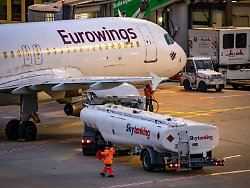Friday, May 7th, 2021
Plan for more sustainable flying
Federal government promotes “clean” kerosene
Aviation emits millions of tons of CO2 every year. German airlines are now to gradually use electricity-based kerosene. But the production of the green fuel is expensive. Different financing models are therefore possible.
The German airlines are to gradually switch to CO2-free fuels in the coming years in order to protect the climate. The federal government has agreed with the airlines on a step-by-step plan for the decarbonization of air traffic, reported the “Welt”. Transport Minister Andreas Scheuer said that by switching to electricity-based kerosene, “millions of tons of CO2 emissions” could be saved in air traffic.
Scheuer announced that his ministry had already commissioned the German Aerospace Center to design a production system with partners from research and industry, “so that we can produce the fuel economically and put it into use more quickly”. The aim is to “fly climate-neutral”.
According to the Federal Climate Protection Act, the first step in 2026 is to add 0.2 percent sustainable fuel to kerosene, as reported by “Welt”. The binding minimum quota should increase to two percent by 2030. For this, 200,000 tons of sustainable kerosene should be produced. This amount is “a realistic first step that is by no means too small,” said BP Europe’s CEO, Wolfgang Langhoff, who is also chairman of the mineral oil industry association, to “Welt”. This amount of kerosene “enables the decarbonization of about a third of all German domestic flights by 2030”.
The German government wants to support the construction of production facilities for electricity-based kerosene with one billion euros, the newspaper reported. The high costs of green kerosene should not be at the expense of passengers or the competitiveness of the German aviation industry – it is therefore being discussed whether the production of the climate-neutral fuel should be subsidized by the state. Alternatively, the airlines could be compensated for the higher costs of kerosene procurement by reallocating the air traffic tax, wrote the “Welt”.
.
